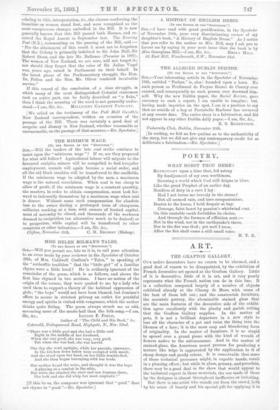MISS HELEN AMMAN'S TALES.
[TO THE EDITOR OF THE " SPECTATOR."]
you permit me, late as it is, to call your attention to an error made by your reviewer in the Spectator of October 28th, of Mrs. Caldwell Crofton's " Tales," in speaking of the " autherftic tradition" that the "little girl" of a familiar rhyme wore a little hood P He is evidently ignorant of the remainder of the poem, which is as follows, and shows the 'first line rhymed in two sections. I have no notion of the origin of the verses; they were quoted to me by a lady who used them to support a theory of the habitual oppression of girls ; "the boys" would not have been blamed, but Jemima's effort to secure in strictest privacy an outlet for youthful energy and spirits is visited with vengeance, which the author thinks quite fitting. The poem always struck me as odd, savouring more of the music-hall than the folk-song.--I am,
Author of " The Child and His Book," &c.
Cotswold, Bishopswood Road, Highgate, N., Nov. 22nd.
"There was a little gurl and she had a little curl Right in the middle of her forehead, When 4he was good, she was very, very good, But when she was bad, she was horrid.
One day she went upstairs, while her parents, unawares, In the kitchen down below were occupied with meals, And she stood upon her head, on her little truckle-bed,
And she then began hurraying with her heels.
Her mother heard the noise, and thought it was the boys A-playing at a combat in the attic, But when she climbed the stair and saw Jemima there, She took and she did whip her most emphatic !"
[If this be so, the composer was ignorant that " good" does not rhyme to "good."—ED. Spectator.]






































 Previous page
Previous page